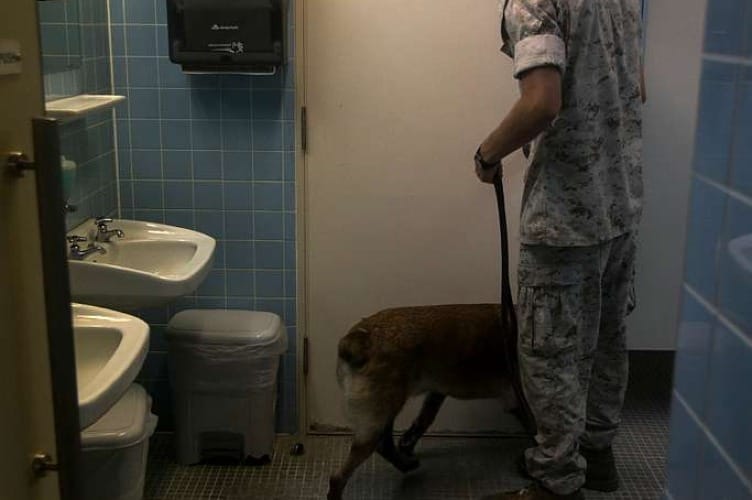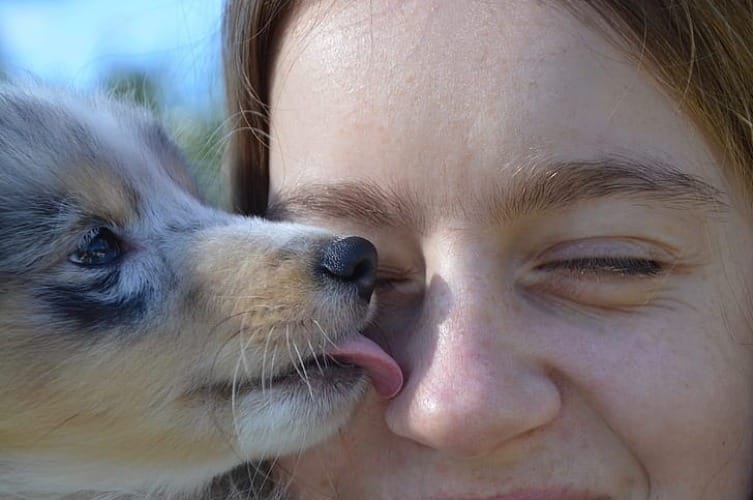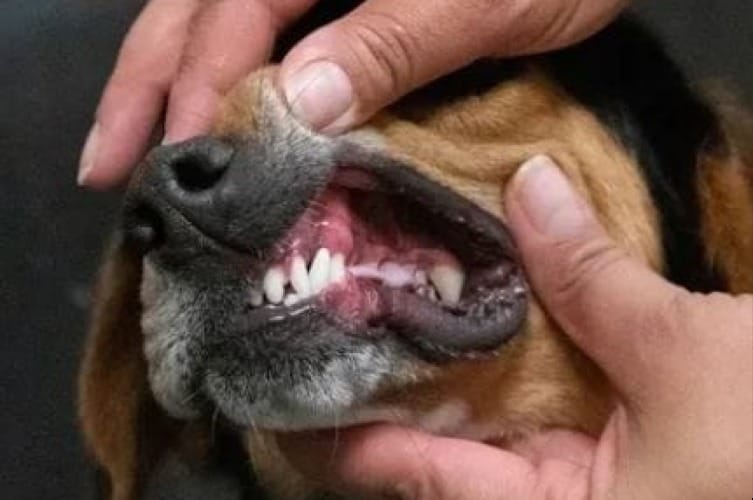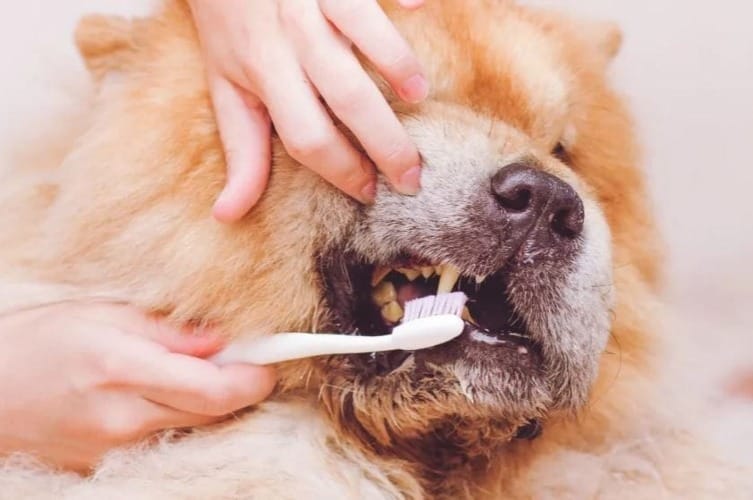Dogs are often referred to as man's best friend, and for good reason. They are loyal, loving, and provide companionship to millions of people around the world. However, there is a long-standing debate about whether a dog's mouth is cleaner than a toilet. This topic has been discussed for years, and many people have different opinions on the matter.
Some people believe that a dog's mouth is cleaner than a toilet because dogs have natural antibacterial properties in their saliva. Others argue that a dog's mouth is full of bacteria and germs, and that it is not cleaner than a toilet. The truth is, both of these statements are partially true. While dogs do have antibacterial properties in their saliva, they also have bacteria and germs in their mouths. The amount of bacteria and germs in a dog's mouth can vary depending on the dog's diet, dental hygiene, and overall health.
Myth Versus Science
Origin of the Myth
The myth that a dog's mouth is cleaner than a toilet is believed to have originated from a few sources. One possible source is the observation that dogs tend to lick their wounds, which may lead to the assumption that their saliva has some sort of antiseptic properties. Additionally, dogs tend to groom themselves frequently, which may give the impression that their mouths are cleaner than other animals.
However, these observations do not necessarily mean that a dog's mouth is cleaner than a toilet. In fact, there are several factors that contribute to the cleanliness of a dog's mouth, such as their diet, dental hygiene, and overall health.
Scientific Evidence
Scientific evidence suggests that a dog's mouth is not necessarily cleaner than a toilet. In fact, a study conducted by the American Society for Microbiology found that the mouths of dogs are home to a variety of bacteria, some of which can be harmful to humans. The study also found that the bacteria present in a dog's mouth can vary depending on their diet, age, and overall health.
It is worth noting that while a dog's mouth may not be cleaner than a toilet, it is not necessarily a cause for concern. Most of the bacteria present in a dog's mouth are harmless to humans, and the risk of contracting an infection from a dog's mouth is relatively low.
In conclusion, while the myth that a dog's mouth is cleaner than a toilet may have some basis in observation, scientific evidence suggests that it is not necessarily true. A dog's mouth can harbor a variety of bacteria, some of which can be harmful to humans. However, the risk of contracting an infection from a dog's mouth is relatively low, and most of the bacteria present in a dog's mouth are harmless.

Understanding a Dog's Mouth
Dogs have been known to lick their own wounds, their owners' faces, and even eat poop, which leads to the question of whether a dog's mouth is cleaner than a toilet. To answer this question, it is important to understand the microbial flora and enzymatic properties of a dog's mouth.
Microbial Flora
A dog's mouth is home to a diverse range of microbes, including bacteria, viruses, and fungi. While some of these microbes are harmless, others can cause infections and diseases. For instance, the bacteria in a dog's mouth can cause periodontal disease, which is a common dental problem in dogs.
However, it is worth noting that the microbial flora in a dog's mouth is different from that in a human's mouth. Dogs have a higher concentration of bacteria in their mouths, which can make their saliva appear dirtier than human saliva. Nonetheless, this does not mean that a dog's mouth is dirtier than a toilet.
Enzymatic Properties
Dogs have enzymes in their saliva that help to break down food particles and kill harmful bacteria. For instance, lysozyme is an enzyme in a dog's saliva that can destroy the cell walls of bacteria. Additionally, dogs have a high pH level in their mouths, which can help to kill bacteria.
Moreover, dogs have a natural inclination to clean their mouths by licking their fur, which can help to remove food particles and bacteria. However, it is worth noting that excessive licking can cause irritation and infection.
In conclusion, a dog's mouth is not necessarily cleaner than a toilet. While a dog's mouth has a higher concentration of bacteria, it also has enzymes and a high pH level that can help to kill harmful bacteria. Therefore, it is important to maintain good oral hygiene in dogs by brushing their teeth regularly and taking them for dental check-ups.

Comparing with a Toilet
Toilet Microbiology
When comparing a dog's mouth to a toilet, it's important to consider the microbiology of both. Toilets are known to harbor a variety of bacteria, including E. coli, staphylococcus, and streptococcus. These bacteria can be harmful to humans and can cause illnesses such as diarrhea, urinary tract infections, and even pneumonia.
On the other hand, a dog's mouth also contains bacteria, but the types of bacteria are different from those found in a toilet. Dogs have a variety of bacteria in their mouths that are specific to their species, such as Pasteurella, which can cause infections in humans if they are bitten by a dog.
It's important to note that while a dog's mouth may contain bacteria that are harmful to humans, the risk of contracting an illness from a dog's mouth is relatively low. Most people who interact with dogs do not become sick from the bacteria in their mouths.
Hygiene Practices
When it comes to hygiene practices, toilets are generally considered to be more hygienic than a dog's mouth. Toilets are regularly cleaned with disinfectants and other cleaning agents to reduce the risk of bacterial contamination.
Dogs, on the other hand, are not cleaned as regularly as toilets. While some dog owners may brush their dog's teeth or use mouthwash to reduce the amount of bacteria in their mouths, not all dog owners practice these hygiene practices.
In conclusion, while a dog's mouth may contain bacteria that are harmful to humans, the risk of contracting an illness from a dog's mouth is relatively low. However, when it comes to hygiene practices, toilets are generally considered to be more hygienic than a dog's mouth.

Health Implications
Zoonotic Bacteria
Dogs carry a variety of bacteria in their mouths, some of which can be harmful to humans. One of the most well-known is Pasteurella, which can cause skin infections and even sepsis in people with weakened immune systems. Other zoonotic bacteria that can be found in a dog's mouth include Capnocytophaga, which can cause severe infections in people with weakened immune systems, and Streptococcus, which can cause infections ranging from mild to life-threatening.
It is important to note that while dogs do carry these bacteria, the risk of infection is relatively low. Most healthy individuals are able to fight off these bacteria without any serious health consequences. However, those with weakened immune systems, such as young children, the elderly, and people with certain medical conditions, may be more susceptible to infection.
Human Health Risks
While the risk of infection from a dog's mouth is relatively low, there are still some health risks to consider. One of the most obvious is the risk of injury from a dog bite. Even a minor bite can lead to infection, so it is important to clean and disinfect any wounds immediately.
Another potential health risk is the transmission of parasites. Dogs can carry a variety of parasites in their mouths, including fleas and ticks, which can then be transferred to humans. This can lead to a range of health problems, from minor skin irritations to more serious illnesses such as Lyme disease.
Overall, while a dog's mouth may not be as clean as a toilet, the risk of serious health problems is relatively low. By practicing good hygiene and taking basic precautions, such as washing your hands after handling your dog and keeping your dog's vaccinations up to date, you can minimize the risk of infection and enjoy a healthy, happy relationship with your furry friend.

Dog Licking Behavior
Reasons Dogs Lick
Dogs are known to be affectionate creatures and licking is one of the ways they show their love and affection. However, there are other reasons why dogs lick. One of the main reasons is to communicate with their owners or other dogs. For instance, a dog may lick their owner's face to show their submission or to seek attention.
Another reason why dogs lick is to groom themselves or others. Dogs have a natural instinct to keep themselves clean, and licking is one of the ways they do this. They also use licking to clean wounds and keep them free from infection.
Effects on Humans
While dog licking behavior is generally harmless, it can have some effects on humans. For instance, dogs' mouths contain bacteria, and when they lick humans, they can transfer these bacteria to them. This can lead to infections, especially if the person has an open wound or a weakened immune system.
Additionally, some people may be allergic to dogs' saliva, and when they are licked, they may experience an allergic reaction. This can cause symptoms such as itching, redness, and swelling.
To minimize the risks associated with dog licking behavior, it is important to train dogs not to lick excessively and to keep them clean and healthy. It is also essential for humans to practice good hygiene and avoid exposing themselves to dogs' saliva if they have open wounds or allergies.

Cleaning and Hygiene
Dog Oral Care
Dogs have a natural tendency to lick themselves, their surroundings and their owners. This means that their mouths can harbor a variety of bacteria and germs. However, with proper oral care, a dog's mouth can be kept clean and healthy.
Regular brushing of a dog's teeth can help prevent the buildup of plaque and tartar, which are breeding grounds for harmful bacteria. Additionally, providing dogs with dental chews and toys can help promote healthy teeth and gums.
Bathroom Cleanliness
While it is commonly believed that a dog's mouth is cleaner than a toilet, it is important to note that both can harbor harmful bacteria. Bathrooms should be regularly cleaned and disinfected to prevent the spread of germs.
Toilets should be cleaned with a disinfectant, and the area around the toilet should also be cleaned regularly. Additionally, it is important to wash hands thoroughly after using the bathroom or handling anything that may be contaminated.
Overall, maintaining proper cleaning and hygiene practices can help keep both dogs and humans healthy and free from harmful bacteria.

Common Misconceptions
Cleanliness Myths
There is a common misconception that a dog's mouth is cleaner than a human's mouth. However, this is not entirely true. While a dog's mouth does contain certain enzymes and bacteria that can help fight off harmful microorganisms, it also contains a significant amount of harmful bacteria that can cause serious health problems for both dogs and humans.
Another myth is that a dog's mouth is cleaner than a toilet. While it is true that a toilet bowl can contain a lot of harmful bacteria, a dog's mouth can also contain a significant amount of harmful bacteria that can cause serious health problems. Therefore, it is important to take proper precautions when handling a dog's mouth.
Misinterpretation of Licking
Many people believe that a dog's mouth is clean because they often lick their wounds. However, this is not necessarily true. While a dog's saliva does contain certain enzymes that can help promote healing, it also contains harmful bacteria that can cause infections.
Furthermore, dogs often lick their wounds because it helps to soothe the pain and itching. This does not necessarily mean that their saliva is cleaning the wound. In fact, excessive licking can actually delay the healing process and cause further damage to the wound.
In conclusion, it is important to understand that a dog's mouth is not necessarily cleaner than a human's mouth or a toilet. While there are certain enzymes and bacteria that can be beneficial, there are also harmful bacteria that can cause serious health problems. Therefore, it is important to take proper precautions when handling a dog's mouth and to not rely on misconceptions or myths.
Expert Opinions
Veterinary Insights
Veterinarians have long been asked whether a dog's mouth is cleaner than a toilet. According to Dr. John Oxford, a professor of virology and bacteriology at Queen Mary University in London, ""The simple answer is no."" He explains that while a dog's mouth does contain certain bacteria that are not present in human mouths, it also contains a host of other bacteria that can be harmful to humans.
Dr. Katy Nelson, a veterinarian and host of ""The Pet Show with Dr. Katy"" on Washington DC's News Channel 8, agrees that a dog's mouth is not cleaner than a toilet. She points out that dogs often lick themselves in areas that are not very clean, and they also eat things that are not meant for human consumption. This can lead to the presence of harmful bacteria in their mouths.
Microbiologists' Views
Microbiologists also weigh in on the debate. Dr. Charles Gerba, a microbiologist at the University of Arizona, tested the number of bacteria found in various places in the home, including the toilet and a dog's food bowl. He found that the dog's food bowl had more bacteria than the toilet. However, he notes that this does not necessarily mean that a dog's mouth is cleaner than a toilet.
Dr. Gerba also points out that the type of bacteria found in a dog's mouth is different from the type found in a human mouth. While some of the bacteria may be harmless, others can cause infections in humans. Therefore, it is important to take precautions when allowing a dog to lick a person's face or mouth.
In conclusion, while there may be some differences in the types of bacteria found in a dog's mouth and a toilet, it is clear that a dog's mouth is not cleaner than a toilet. It is important to practice good hygiene and take precautions when interacting with dogs to reduce the risk of bacterial infections.

Frequently Asked Questions
- How does the self-cleaning process of a dog's mouth work?
Dogs have a self-cleaning mechanism in their mouths that helps keep them clean. Their saliva contains enzymes that break down food particles and bacteria. Additionally, dogs have a rough tongue that acts like a natural toothbrush, helping to remove debris and bacteria from their teeth and gums.
- Can dog saliva pose health risks to humans?
While it is generally safe for humans to come into contact with dog saliva, there are some risks to be aware of. Dogs can carry certain bacteria in their mouths that can cause infections in humans, such as Pasteurella. Additionally, if a dog has an open wound or infection in their mouth, their saliva can transmit these pathogens to humans.
- In terms of cleanliness, how do dogs compare to cats?
While both dogs and cats have self-cleaning mechanisms in their mouths, there is no clear winner in terms of cleanliness. Cats have rough tongues that are even more effective at removing debris and bacteria from their teeth than dogs. However, cats also tend to groom themselves more frequently than dogs, which can help keep their mouths clean.
- Are human mouths typically less clean than toilet seats?
Contrary to popular belief, human mouths are not typically less clean than toilet seats. While there are certainly bacteria present in the mouth, the vast majority of these are harmless or even beneficial. In fact, many of the same bacteria that are found in the mouth are also present in the gut, where they play important roles in digestion and immune function.
- How does dog saliva compare to cat saliva in terms of cleanliness?
There is no clear winner when it comes to the cleanliness of dog and cat saliva. Both contain enzymes and antibacterial compounds that help to break down food particles and fight off harmful bacteria. However, cats have been found to have a higher concentration of certain antibacterial compounds in their saliva than dogs.
- Do dogs possess antibacterial properties in their saliva?
Yes, dogs do possess antibacterial properties in their saliva. Their saliva contains enzymes and antibacterial compounds that help to break down food particles and fight off harmful bacteria. In fact, some studies have suggested that certain compounds found in dog saliva may even have potential therapeutic applications for humans.




